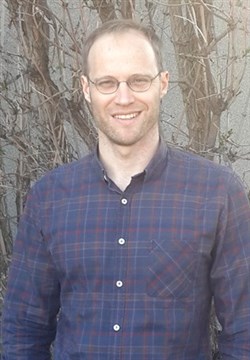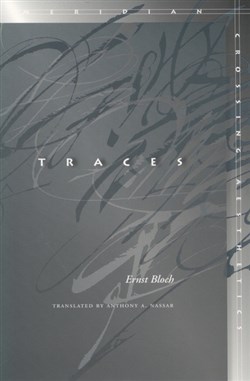William Norman Coker, Asst. Prof., Department of Cultures, Civilization and Ideas
BY MELİS ERDEM (ARCH/II)
 I think many books have influenced me, but the one that I’d like to talk about is Ernst Bloch’s “Traces.” This is a work that really straddles the border between literature and philosophy; it was first published in 1930. And it begins with these enigmatic lines, “I am, but I do not have myself. That is how we become.” So the way in which we progress from mere being to self-possession is the subject of the book. The original German title is “Spuren,” translated as “Traces.”
I think many books have influenced me, but the one that I’d like to talk about is Ernst Bloch’s “Traces.” This is a work that really straddles the border between literature and philosophy; it was first published in 1930. And it begins with these enigmatic lines, “I am, but I do not have myself. That is how we become.” So the way in which we progress from mere being to self-possession is the subject of the book. The original German title is “Spuren,” translated as “Traces.”
I first read “Traces” in the fall of 2004, when I had just arrived in Germany for two semesters of dissertation research, for which I had been awarded a scholarship. And that sounds great, right? But I was actually in a deep malaise at the time; I was having a hard time focusing and was thinking constantly about quitting graduate study. It was kind of a difficult period in my life, even though I was privileged to have it.
I was spending a few hours a day in an archive in Berlin, basically reading illegible manuscripts by the 18th-century German novelist Jean Paul and trying to stay awake. And in the afternoons I started to explore other parts of the library, and there I discovered Bloch, who has a huge corpus with lots of works. So in my head I had circulating all the classic motifs of romanticism: the self as a never-ending project, nature as our true home from which we are alienated. In this respect, you might think about the German romantic poet Novalis saying that “philosophy is homesickness.”
This quotation really resonates in a lot of the German tradition; think of Georg Lukacs, who characterizes the novel as the genre that best suits the modern condition of “transcendental homelessness.” We are all somehow homeless or adrift or nomadic in the modern world. Bloch also fits into this tradition, but he turns it around; he places our home in the future rather than the past.
“Traces” is actually a very short book, only about 200 pages long. It consists of short vignettes, kind of like fairy tales. And also like detective stories, which is why it’s called “Traces”: in each story there is a trace followed to some kind of conclusion. Many of these stories turn on cases of mistaken identity, or they reflect on how fantasy always inflects our reality, how you cannot have reality without fantasy, and vice versa. Taken as a whole, the collection of stories that make up this volume serve as allegories of the human quest to construct a world in which we will finally be at home.
So Bloch mobilizes all of the poetic forces of the Western tradition in the service of this alternative vision. He argues that the garden or the paradise we were thinking we were expelled from is actually one we’ve not yet built for ourselves.
The political implications of all this are clear, though Bloch does not deal with that explicitly in this book. The technical means exist to feed comfortably the entirety of the world’s population, and we know this, but we do not pursue it in a collective and systematic way. Whatever social betterment we achieve takes place by accident in a system intended to maximize the accumulation of private capital, or else in partial victories scored against this overriding logic by social movements.
I read Bloch at a time when I was just getting started on my thesis and was a little bit adrift. During that year, this became one of several factors that moved me toward taking a detour in my professional life. I left Germany after two semesters and went to Latvia, where I taught classes in English and German at a language school. I took a leave of absence from my studies for that. Working in a soup kitchen on the weekends caused me to think a lot about how insufficient charity actually is, as a solution to the crises that we face in the world. After that year, I went back to the US and resumed work on my thesis. I had new determination, because Bloch helped me link my feeling of alienation in my own life with global matters. I was able to combine the love of literature that I still have with a new commitment to the world outside my head.
